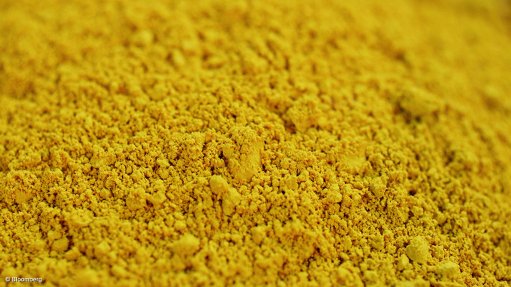
Photo by: Bloomberg
TORONTO (miningweekly.com) – Canadian Securities Exchange-listed project developer GoviEx Uranium and TSX-listed Denison Mines have completed a C$5-million all-scrip transaction to merge their respective African assets to create the largest undeveloped uranium resource base in the world.
"The closing of this transaction with Denison signifies a new beginning for GoviEx. The company has greatly expanded its uranium resources, diversified geographically, and introduced a project pipeline to add leverage to the development of our flagship Madaouela project, in Niger,” stated the son of billionaire mining legend Robert Friedland, GoviEx founder and executive chairperson Govind Friedland.
Under the terms of the deal, GoviEx had acquired Denison subsidiary Rockgate Capital, which held all of Denison's Africa-based uranium interests (collectively DML Africa), in exchange for 56.05-million shares of GoviEx and 22.42-million common share purchase warrants of GoviEx.
GoviEx's new combined asset portfolio now included two permitted uranium development projects – the Madaouela project in Niger and the Mutanga project in Zambia. It also included the Falea project, an advanced exploration-stage project in Mali, and the exploration-stage Dome project in Namibia.
GoviEx advised that it now controlled one of the largest uranium resource bases among publicly listed companies, with combined National Instrument 43-101-compliant measured and indicated resources of 124.29-million pounds uranium oxide (U3O8), as well as inferred resources of 73.11-million pounds U3O8.
Friedland added that the uranium market also might be reaching a turning point, as GoviEx saw the classic signs of a commodity being at, or near, the bottom of the commodity cycle. “In March, China unveiled its new five-year plan to increase its nuclear power-generation capacity from 27 GW to 150 GW by 2030. With more than C$700-billion in nuclear power generation investments currently planned, the long-term fundamentals for the uranium market remain incredibly strong," he said.
At the time of closing the transaction, DML Africa was capitalised with a minimum working capital of $700 000, which was equivalent to the forecast annual budget for the operations of DML Africa.
For as long as Denison held at least 5% of the issued and outstanding common shares of GoviEx, Denison had the right to nominate one director to the GoviEx board of directors and would have the right to participate in future GoviEx equity financings to maintain its pro-rata ownership. To this end, GoviEx appointed Denison president and CEO David Cates as Denison's nominee director, to the GoviEx board.